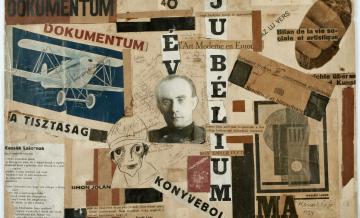The staff of the Kassák Museum is constantly working to make the collection available through the OPAC of the Petőfi Literary Museum (PIM). Currently, the archives of Lajos Kassák can be researched with a traditional (paper-based) inventory catalogue. Collection items acquired after 2011 are available through the PIM OPAC.
MAIN COLLECTION
The main collection of the Kassák Museum is the archives of Lajos Kassák, acquired from Mrs. Lajos Kassák née Klára Kárpáti in 1975.

The Kassák Museum has the most significant collection of avant-garde publications in Hungary. A valuable part of the museum book material is the former library of Kassák, with several first editions.

The main collection of the Kassák Museum also holds a small but carefully curated contemporary art collection, which consists mostly of related works by artists who were inspired by Kassák in creative or theoretical terms.
SPECIAL COLLECTIONS
In addition to working with Kassák's oeuvre, an important goal of the Kassák Museum is to collect documents of avant-garde and modernism in Hungary, especially the archives of artists and intellectuals associated with Kassák. With the extension of the collection in this direction, the activities and relations of Kassák and the international networks of the Hungarian avant-garde movement can be studied in a broader context.

The archives of the avant-garde painter consists of nearly 2 500 items, including manuscripts, correspondence and photographs.

The archives of the avant-garde actor, librarian and journalist consists of nearly 5 000 items, including avant-garde and modernist magazines, samizdat publications, posters, manuscripts, correspondence and photographs.

The archives of the avant-garde poet and publisher consists of nearly 2 300 items, including avant-garde and modernist magazines, manuscripts, correspondence and photographs.

This archive was left to the collection of the museum according to the will of Pál Kövesdy. The archive contains documents mainly related to the activities of Kövesdy’s galleries in New York.

The archive of the literary historian consists of nearly 4 500 items and contains Bodri's professional correspondence as well as manuscripts of his papers and books.

